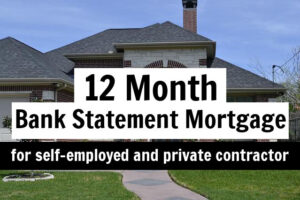For business owners or private contractors a bank statement mortgage may be the option you need to turn to when looking to get a mortgage if you show low income on your tax returns.
What is a bank statement mortgage loan?
A bank statement mortgage is a home loan that uses a borrower’s bank statements to calculate their income. This is considered an alternative documentation loan type since tax returns are not used to calculate income.
These loans are for self-employed borrowers or private contractors who have substantial tax write offs. When showing low income on tax returns it can be challenging to prove the ability to repay the mortgage. By using bank statements to qualify, there is a more accurate approach to calculating income.
Requirements
- At least 10% down payment (or 10% equity on refinance)
- 600 minimum credit score
- 12 months bank statements. Income will be averaged over 12 month period
- Year to date profit and loss
- Must be self-employed at least 2 years (rare cases allow for less than 2 years self-employed)
- Primary residence, second home, and investment property allowed
- Single family home, 2-4 unit, and condo allowed
- Available on home purchase, refinance, and cash out refinance
Bank Account Types
Personal Bank Statements – When using personal bank statements to qualify, the deposits will be carefully reviewed to determine where deposits are coming from.
If deposits are consistently coming from another account, account statements (two months) will need to be provided to confirm it is an account associated with the business.
If using personal account to qualify, you do NOT need to be 100% owner of the business, but all individuals listed on the account must also be on the new mortgage loan.
Any large/unusual deposits will need to be sourced to confirm they were from business activity (as opposed to a deposit from the sale of an asset, or a loan). If the deposit was from a source other than business activity, that deposit will be excluded from the income average calculation.
Business Bank Statements – When using business bank statements to qualify, the deposits will be used minus an expense factor. For simplicity purposes some lenders will use a 50% expense factor. Example: if total deposits are 200K in the last 12 months, the qualifying income would be 100K.
Some lenders will allow a more precise expense factor based on CPA letter or profit and loss statement. Going that direction may allow for higher use of business account deposits.
If using a business account to qualify you MUST be 100% owner of the business.
Bank Statement Mortgage Interest Rates
When getting an alternative documentation loan like a bank statement mortgage, interest rates are not the same as what you would see on a conventional or FHA mortgage.
Using bank statements to qualify is an nontraditional process of calculating income. For that reason the loans are considered slightly “higher risk”. Since that is the case, you can expect that interest rates are higher than traditional mortgage loan types.
You can typically choose from a couple different options: 5/1 ARM or 30 year fixed.
- The 5/1 ARM (adjustable rate mortgage) means the rate is fixed for the first 5 years, and then has the ability to adjust (once per year after the first 5 years). There are always caps on how much the rate can adjust after the first 5 years, and each lender has different guidelines on what the caps are, so be sure to ask.
- The 30 year fixed option will be a higher rate than the 5/1 ARM, but it gives you the long term comfort of knowing it will never change.
Keep in mind, most people do not keep a mortgage for more than 5-7 years. A lot can change in 5-7 years. You may end up wanting to: upgrade, downsize, relocate, or refinance. Which is why many times, a 5/1 ARM ends up being a good option to take into consideration.
Either way, you can decide which option suits you best.
Get a bank statement mortgage rate quote today here.
24 Month Bank Statement Mortgage Loans
If the deposits on the bank statements over the most recent 12 months are a bit inconsistent, the lender may ask for an additional 12 months of bank statements to demonstrate consistency/stability.
Typically only 12 months bank statements are needed, but in some cases having the full 24 month bank statement history will further solidify the borrower’s ability to repay.
One Month Bank Statement Loans
In some (rare) cases it may be possible to use one month’s bank statements to get approved.
This loan type has more strict credit and down payment restrictions than other comparable bank statement loans.
For the one month bank statement loan: minimum 650 credit, 25% down payment (home purchase), 30% equity (home refinance), and no mortgage delinquency in the most recent 5 years.
In addition there can be zero NSFs (non-sufficient fund fees) on the month provided and year-to-date.
Lastly, there is zero tolerance for any new charge-offs, collections, or tax liens in the most recent 3 years for the one month bank statement loan program.
That program is meant to provide simplicity for the well qualified borrower.
In Summary
A bank statement mortgage loan is a fantastic alternative documentation loan for self-employed or private contractor borrowers.
If you have been told you don’t qualify for a mortgage due to unique income circumstances on your tax returns, a bank statement mortgage may be your ticket to accomplish your home ownership goals.
I invite to you to reach out.
Get your questions answered.
I’ve been able to help many borrowers who have been told by other lenders that they don’t qualify.
If I cannot help, I should be able to point you in the right direction at the very least.













12 Comments
Leave your reply.